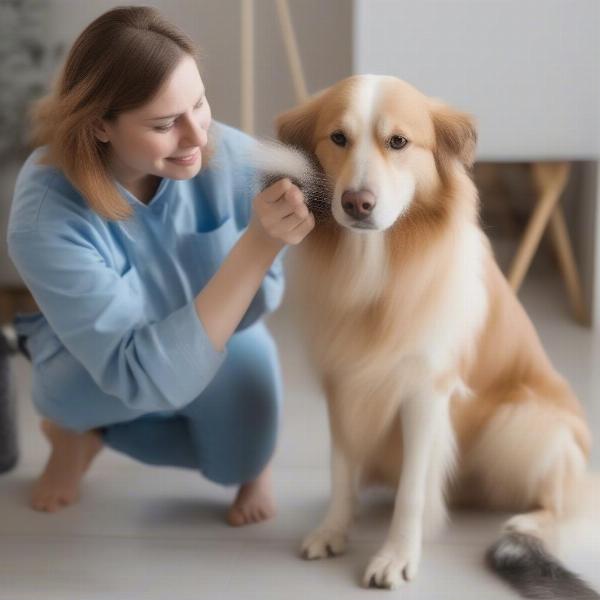Real dogs enrich our lives in countless ways, offering unconditional love, companionship, and even a dose of daily humor. From playful puppies to wise old seniors, understanding their unique needs is key to building a strong, lasting bond. This guide delves into the world of real dogs, exploring everything from breed selection and healthcare to training, nutrition, and daily care.
Choosing the Right Breed for Your Lifestyle
Selecting a real dog is a big decision. Consider your living situation, activity level, and experience with dogs. Are you looking for a cuddly lap dog or an energetic hiking buddy? Researching breeds thoroughly is crucial. Some breeds are prone to certain health issues, while others require specialized grooming. Talking to breeders, veterinarians, and other dog owners can provide valuable insights.
Do you have a small apartment or a large house with a yard? This will influence the size and energy level of the dog that suits you best. Active owners might prefer breeds like Border Collies or Huskies, while those living in smaller spaces might find a French Bulldog or Cavalier King Charles Spaniel a better fit.
Health and Wellness for Real Dogs
Keeping your real dog healthy is paramount. Regular veterinary checkups, vaccinations, and preventative care are essential. Understanding common health issues within specific breeds can help you be prepared and proactive. A healthy diet, regular exercise, and mental stimulation also contribute to overall well-being. Just like humans, dogs need a balanced lifestyle to thrive.
Training and Behavior: Building a Strong Bond
Training is not just about teaching tricks; it’s about building a strong relationship with your real dog. Positive reinforcement methods, such as rewarding desired behaviors, are highly effective. real looking stuffed dogs Consistency and patience are key, as every dog learns at their own pace. Understanding canine body language can help you anticipate their needs and prevent potential behavioral issues.
Nutrition and Feeding: Fueling Your Canine Companion
Providing your real dog with a balanced diet is essential for their health and energy levels. High-quality dog food formulated for their age and breed is recommended. collarbone dog Avoid feeding table scraps, as many human foods can be toxic to dogs. Always consult with your veterinarian before making any significant changes to your dog’s diet.
Grooming and Hygiene: Keeping Your Dog Clean and Comfortable
Regular grooming not only keeps your real dog looking their best but also contributes to their health and comfort. Brushing helps remove loose fur and prevents matting.  Dog Grooming and Hygiene Bathing, nail trimming, and ear cleaning are also important aspects of dog hygiene.
Dog Grooming and Hygiene Bathing, nail trimming, and ear cleaning are also important aspects of dog hygiene.
Exercise and Enrichment: Keeping Your Dog Active and Happy
Real dogs need regular exercise to stay physically and mentally stimulated. Daily walks, playtime, and interactive toys can help prevent boredom and destructive behaviors. swamp dogs Tailor the type and intensity of exercise to your dog’s breed, age, and health condition.
Conclusion: The Joys of Real Dog Ownership
Owning a real dog is a rewarding experience. They bring joy, laughter, and unconditional love to our lives. By understanding their needs and providing them with proper care, we can build a strong and lasting bond with our canine companions. Remember that responsible dog ownership involves commitment, patience, and a willingness to learn and adapt.
FAQ
- What is the best way to train a real dog? Positive reinforcement methods are generally considered the most effective and humane way to train dogs.
- How often should I take my real dog to the vet? Annual checkups are recommended for most adult dogs, but puppies and senior dogs may require more frequent visits.
- What are some common health problems in real dogs? Common health problems vary by breed but can include hip dysplasia, allergies, and certain cancers.
- What is the best food for my real dog? The best food for your dog will depend on their age, breed, and any specific dietary needs. Consult with your veterinarian for personalized recommendations.
- How much exercise does my real dog need? The amount of exercise will vary depending on breed, age, and individual needs, but most dogs benefit from at least 30 minutes of exercise per day.
- How do I choose the right breed of dog for me? Consider your lifestyle, living situation, and experience with dogs when choosing a breed. Researching breeds thoroughly is essential.
- What are the essential supplies I need for a new puppy? Essential supplies include food and water bowls, a collar and leash, a comfortable bed, toys, and grooming tools.
why are black people afraid of dogs
About ILM Dog
ILM Dog is your trusted international resource for all things canine. We offer expert advice on dog breeds, health, training, nutrition, grooming, and much more. Whether you’re a first-time dog owner or a seasoned pro, ILM Dog provides practical and reliable information to help you navigate the joys and challenges of dog ownership. We specialize in breed selection guidance, health and wellness tips, training techniques, and nutritional advice. Contact us for personalized support: Email: [email protected], Phone: +44 20-3965-8624. Visit us at ILM Dog.